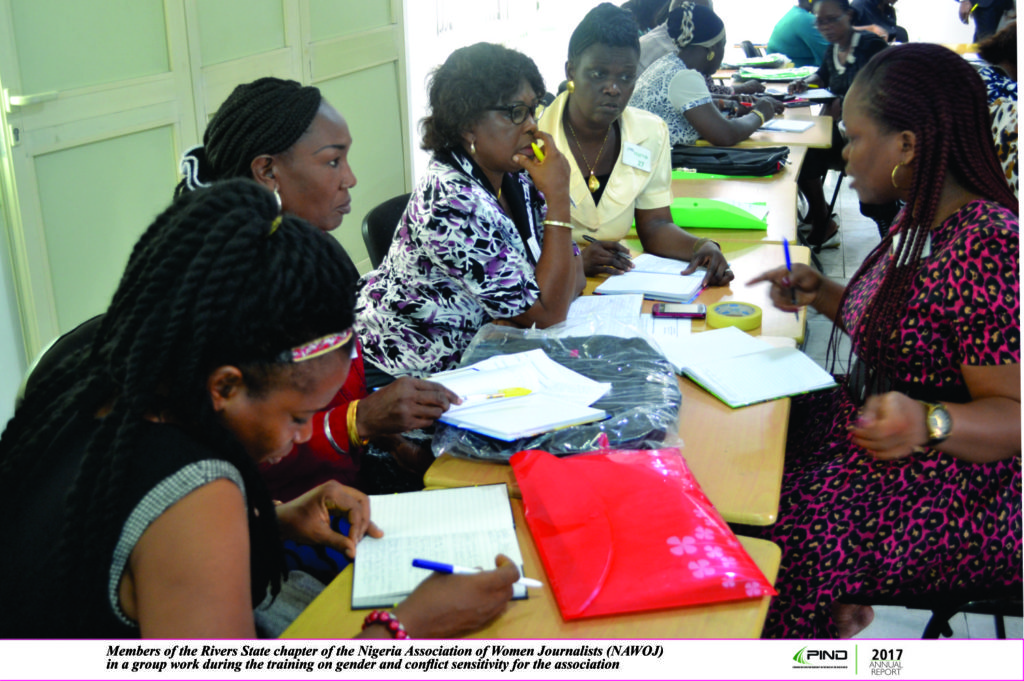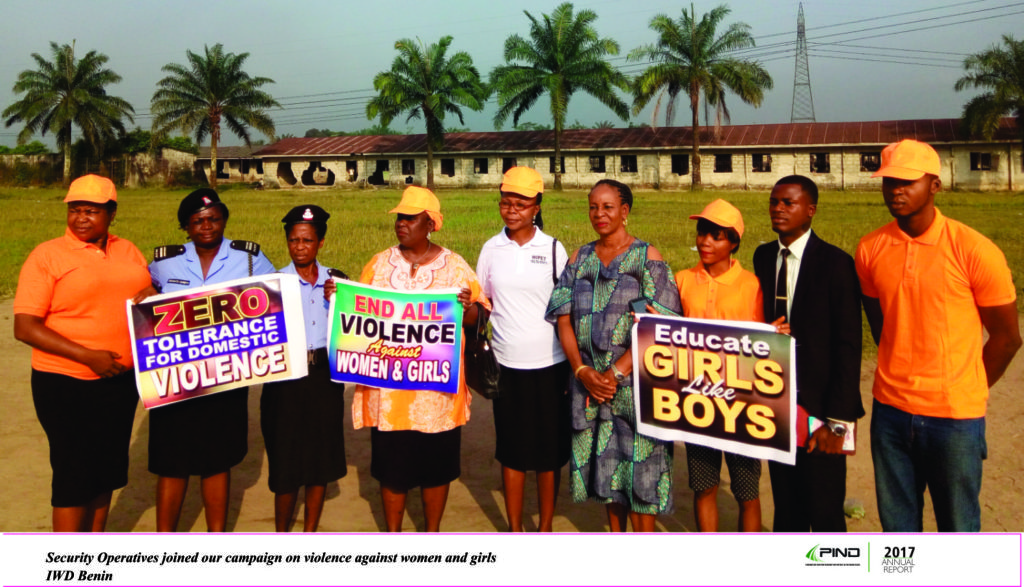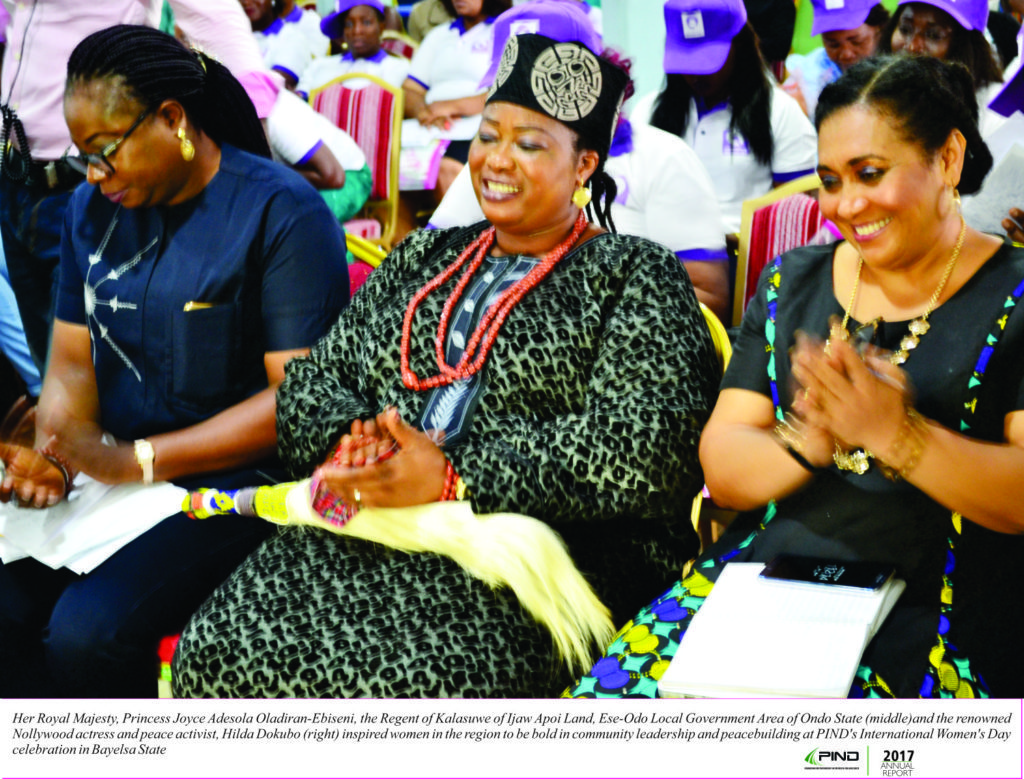PIND, through gender mainstreaming in all its interventions, seeks to ensure equitable participation of men and women in social and economic development of the Niger Delta.
Our research on gender revealed a myriad of issues that were limiting women from participating or benefiting from opportunities that would empower them economically. Such issues include exclusion from decision-making and leadership, inability to access land, limited income generating opportunities (due to traditional gender norms and culture), gender-based violence (GBV) and rape amongst others. A follow on PIND study on the drivers and impact of conflict found that ‘’although women often played a positive role in peace building, their contribution was not always recognized and their voices were muted within traditional structures (page 7)…beyond being victims of conflict, women have key strengths, skills, and roles that should be leveraged for more effective peace building and conflict mitigation. When empowered, women have been known to work effectively to prevent the start and spread of violent conflict.’’
Here is how we utilized these findings in our gender work this 2017:

We RECOGNIZED the critical role of women in peace building in the Niger Delta and EMPOWERED them to do so more effectively:
Women in the media: If equipped with the right skills, women journalists can play a positive role in raising public awareness on development, stability and growth in the region. In collaboration with DFID’s Nigeria Stability and Reconciliation Programme (NSRP), we trained 30 members of the Rivers State National Association of Women Journalists (NAWOJ) and Nigeria Union of Journalists (NUJ) on Gender and Conflict Sensitivity Reporting to build their capacity to mainstream conflict sensitivity and gender in news reportage, writing features, editorials, producing documentaries, project planning and delivery. It also increased their understanding of the role of the media in either mitigating or exacerbating conflicts in the Niger Delta. The journalists reported a change in their perspective on gender issues and conflict after the training.
‘If I hadn’t attended this training, I wouldn’t have known I was doing some things wrong. Now I know how to be conflict sensitive in my reporting to avoid blunder and prevent conflict.’– Mrs Beauty David Ntengot, Journalist, Treasure Base Newspaper, Rivers State.
Our training has equipped these 30 women journalists with the skills to effectively play their naturally endowed roles as peacebuilders by writing stories and news that are balanced and inclusive and raising public awareness on the nexus between development, stability and growth in the region.
Partners for Peace (P4P) Network membership: 309 women joined the P4P network in 2017, of the 843 self-identified peace agents who joined the Network in the year. This is a result of our efforts to deliberately target women and draw them into the Network. Of the 5,703 total membership of the Network from inception to the end of 2017, 2,097 are women.
Being members of the P4P Network has amplified the voices of these 2,097 women as peacebuilders, provided them a platform to share learnings and work collectively with other individuals and institutions to address conflict issues. It also enabled them to benefit from peacebuilding trainings and leverage small grants for peacebuilding interventions in their communities.
Peace Monitors: 27 of the 217 persons we trained as peace monitors in 2017 were women who now provide community level conflict incidence reports for the Early Warning and Early Response (EWER) system. That brought the total number of our trained women peace monitors to 122 out of 487 who contribute to providing data that helps peace actors across the region and nationally to plan evidence-based local conflict prevention or mitigation interventions that have more chances of success.

- We specifically TARGETED Women’s Business Associations and Cooperatives to influence their economic advancement.
The Aladinma Women Association is a multi-purpose cooperative society in Umukabia-Ogodo of Ngor Okpala Local Government Area (LGA) in Imo State with 250 members. About 50 percent of the 250 members of the association are engaged in Cassava farming.
PIND’s capacity building team conducted an organizational capacity assessment of this women association this year. Findings showed gaps in financial management and low capacity to manage the organization. We developed action plan to address these identified gaps. One of the actions in the plan was to hold Group Dynamics Training for the association.
In October, PIND offered a two-day training on Group Dynamics and Leadership to 24 participants from the association. Through the training, the association increased understanding of the importance of communication, and making decision making inclusive as well as sharing roles and responsibilities. During the training, gaps were identified in the association’s operations and documentation capacity. Plans have been put in place to provide coaching and mentoring support to help bridge the gaps.
- We deliberately ENSURED active participation of women in the value chain.
To stimulate the support market for farmers and small businesses in the region, we trained a pool of Aquaculture Service Providers (ASPs) who provide business and best agronomic practices training for fish farmers. We also trained Business Service Providers (BSPs) who provide business advisory services to Small and Medium Enterprises to enhance their competitiveness.
The so trained have made a business of selling their services and earning incomes while some of them have also leveraged funds to expand their businesses. Of the 20 active ASPs in 2017, five (5) are women while four (4) of the 10 active BSPs are women benefitting from participating in the value chain support service line.
Two of these five (5) female ASPs, Blessing Omorodion and Yinka Akinpelu, both in Akure, Ondo State benefitted from our grants support to promote improved pond management practices in aquaculture in the State and one of the women subsequently sold services to 250 farmers within a period of four months in Ondo State.
In 2017, 43% of the707 fish farmers who reported increased income from our aquaculture value chain interventions were women.
A key focus of our cassava intervention was to ensure at least 40% participation of women. The post pilot assessment of the improved agronomic practices trainings done in Mbiri in Ika North Local Government of Delta State and Umukabia in Ngor Okpala Local Government of Imo State showed that out of a total of 795 beneficiaries from these communities, 415 were women, representing 52%.
- We SUPPORTED women to break gender myths affecting access to economic opportunities including new technologies to increase their participation in agricultural value chains.
International Women’s Day (IWD) 2017: In partnership with the DFID Market Development in Niger Delta (MADE) project, the PIND-USAID funded MARKETS ll Project and the Edo State Co-operative Farmers Agency Limited, we organized a forum in Benin City, Edo State on the 7th of March 2017 with the theme “Women, Be Bold for Change in Adopting Agricultural Technologies” to commemorate the day. 161 participants attended the event.
At the forum, over 100 women farmers in aquaculture, cassava, palm oil, poultry, honey and other value chains learned about available agricultural technologies they can adopt to improve the efficiency and productivity of their farming businesses. They were also apprised with practical tactics for overcoming the challenges they face in accessing and using such technologies by a panel of successful women farmers who shared their personal experiences on how they used technology to grow their businesses..
The Forum also provided a platform through which the women farmers interacted, networked and discussed possible collaborations and support with other value chain players from the government, development partners, civil society, financial institutions and the private sector who attended the Forum.
Inspired by the Forum, one of the participants from the civil society, the Working Fingers Initiative International (WOFII) partnered with Lift Above Poverty (LAPO), a micro finance bank operating in the Niger Delta to hold a similar Forum in Asaba, Delta State that reached another 60 women smallholder farmers with the same message of being bold to adopt technologies to enhance their agricultural investments.
Some of the women reached have purchased and adopted the use of the smoking kiln fish technology and are reaping the economic benefit as there is high demand for high quality smoked fish. When some could not afford the high cost of the smoking kiln, they opted for the chorkor oven technology made with bricks which they are making money from as well.
Demonstration of harvesting technology to a women audience: Traditionally, women in the region are forbidden from climbing palm trees to harvest palm fruits because it involves climbing and is arduous. So, despite the introduction of the Mechanical Adjustable Harvester (MAH) which increases farmers’ yield of palm fruit bunches and profit – and does so with significantly less risk of injury (as no climbing is required) – traditions still hindered women in the oil palm value chain from taking advantage of the technology to boost their productivity.
In 2016, PIND began organizing targeted demonstrations for women on the use of the MAH technology addressing the myths and misconceptions around the technology. This sensitization continued into 2017 and by quarter four of the year, two women farmers from Ovia North East in Edo State and Ikom in Cross River State had not only overcome barriers to the use of the MAH but had gone ahead to procure the technology and currently use them to harvest palm fruit bunches for members of their communities as an additional business and source of income.
- We FACILTATED new economic opportunities for young women.
PIND’s Media for Development unit partnered with Herdreamsarervalid Foundation and Lensational International to equip 10 young girls (ages 15 – 23) with photographic skills to enhance their income generation options. The 10 girls (including a Physically Challenged Person) were given a digital camera each to start photography business, taking pictures and selling these globally in online platforms. The venture is expected to grow over time thereby increasing the income of the beneficiaries.

- We SENSITIZED diverse stakeholders on gender inclusive policies and Gender-Based Violence Issues and how they can help.
Gender-friendly agricultural budget in Ondo State: This year, through our Strengthening Advocacy and Civil Engagement (SACE) project, we provided 21 organizations (out of the total 91) with financial assistance and capacity building to advocate for improved governance for marginalized constituencies which include women, specifically tackling issues that limit their economic prosperity within the region. A cluster of the SACE project focused on advocating for an inclusive agriculture policy and budget in Ondo State successfully secured a budget line into the State’s 2018 agricultural sector budget dedicated to supporting women smallholder farmers. This is the first time this has happened and would help increase inclusive policies in the State.
Evidence-based policy and practice for reducing gender based violence: Early in 2017, our Partners for Peace (P4P) Peace Map which captures data on conflict trends in the region highlighted an increase in the number of reported cases of Gender Based Violence (GBV) across the Niger Delta States. To influence policies, knowledge, attitudes and behaviors towards the mitigation of this surging vice, we trained 54 policymakers and implementers from key government agencies including the Ministry of Women Affairs, Ministry of Social Welfare and Rehabilitation, Ministry of Justice, National Orientation Agency, National Human Rights Commission, Nigerian Security and Civil Defence Corps and civil society activists on the importance of mainstreaming gender research in policy formulation and practice. This increased their understanding of issues surrounding violence against women and girls and how to use evidence-based strategies in tackling the menace.
To mark the 2017 International Day of the Girl Child in October, our peacebuilding team also created massive awareness and debate on the effects of conflict and violence on the girl child in the Niger Delta via a Twitter Chat that reached over 10,000 persons on social media.
16 Days of Activism Campaigns on violence against women and girls: The annual 16 days of activism from November 25 to December 10 is used by individuals, groups and women’s rights organizations around the world to call for the elimination of all forms of violence against women and girls. We commemorated the 2017 event by providing small grants to four civil society organizations to run campaigns against gender-based violence in the region. The organizations are Women United for Economic Empowerment (WUEE), Community Empowerment and Development Initiative (CEDI), Ideal Women Advance Initiative (IWAI) and Greater Tomorrow Initiative.
Using a combination of media advocacy, social marketing, town-halls, stakeholder meetings and engagements, school tours, community mobilization, training, and rallies, the campaigns reached thousands of persons. Audience reached included students, teachers, school management boards, law enforcement agencies, informal security groups, trade unions, government ministries and agencies, local governments, media, CSOs, religious groups, rural and urban community members, state lawmakers, traditional rulers, parents, young women and girls. Awareness messages were shared through the media and other education and communication materials on the increased number of reported cases of gender-based violence in the Niger Delta. Victims were encouraged to seek redress and contact information on where victims can seek justice and support was provided.
National Agenda for Women Empowerment and Gender Equality through Gender Working Group – Our gender team actively participated in the 2017 meetings of the Development Partners Group on Gender (DPGG), a national coalition of CSOs working to promote gender inclusiveness in line with the Sustainable Development Goals (SDGs). PIND’s participation provided an avenue to support a proactive, systemic and result oriented national agenda for gender equality and women empowerment in Nigeria that would naturally benefit our region of interest.
- We BUILT capacity of women and men community associations, business membership organizations and other local market actors to engage in public decision-making, local governance and project development.

To address the exclusion of women from decision-making and leadership and their lack of voice in peacebuilding, we worked with our partners, the Participatory Partnership for Community Development (PPCD), Warri, Delta State; the Bayelsa Community and Social Development Agency (CSDA); and the Bayelsa chapter of the region-wide Partners for Peace (P4P) Network to hold a second International Women’s Day (IWD) Forum themed “Women, be Bold for Change in Community Leadership and Peace Building”.
Held on March 29 in Yenagoa, Bayelsa State with 104 persons (92 females and 12 males) in attendance, our two female lead paper presenters at the Forum, in the persons of a woman traditional ruler, Her Royal Majesty, Princess Joyce Adesola Oladiran-Ebiseni, the Regent of Kalasuwe of Ijaw Apoi Land, Ese-Odo Local Government Area of Ondo State and the renowned Nollywood actress and peace activist, Hilda Dokubo inspired the participating women to play active roles in community leadership in Niger Delta communities and step up their involvement in peace building including facilitating opportunity for women to share information and experiences in mitigating conflicts.
In quarter two of 2017, motivated by the knowledge gained from the Forum, participants from Dodo River Regional Development Committee in Bayelsa State cascaded the knowledge to more rural women by organizing five information sharing events in Amatu, Bilabiri and Bisangbene communities through which they enlightened, sensitized and educated the women attendees on the imperative of speaking out and being bold to bring about positive changes for themselves in communities.
After being inspired by the success stories of women who attended the forum, Madam Mariam Anomuoghanran, a participant, renovated and reactivated an abandoned Healthcare Centre in her community, Benikrukru in Warri North Local Government Area of Delta State. She has also gone further to engage seven nurses and doctors to run the facility and hopes to leverage resources from partnership with private organizations and other development partners.

Our advocacy for more women representation in decision-making and leadership yielded results in 2017 as nine (9) business membership organizations (BMOs) including the United Ufuoma Fish Farmers’ Association (UUFFA) in Warri, Delta State involved women in making key decisions, while seven (7) BMOs have appointed women in leadership role as executive officers by quarter three of the year. Overall, our gender activities in 2017 gave 285 women more access to information that can grow their businesses and increase their incomes.
- We ASSESSED our progress in Gender Mainstreaming to ensure we are meeting our gender objectives.
We hired a gender specialist for this assessment. Based on findings from interviews, desk reviews and key observations, we got a rating of MODERATE against the commitments and priorities set in the strategic objectives contained in PIND’s Gender Policy. The assessment noted we have made significant progress in facilitating access to equal opportunities and benefits for women and men in all our corporate policies, program strategies, guidelines and administrative procedures and also in promoting equal representation, voice and participation of both women and men at all levels within PIND’s structure. We were provided with key recommendations that would help improve our gender mainstreaming performance in 2018.
DOWNLOAD REPORT HERE PIND 2017 Annual Report (4249 downloads )



